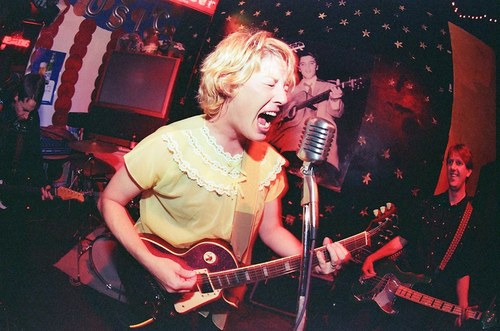|
As a critic, I had to write about the National — report them, box them, sum them up. I once described them — in indelible ink, I’m sorry to say — as “sounding like U2 on a bender.” Deadlines, you reach for that stuff, you don’t look back. Free of the assignments now, I’m enjoying actually getting to know this band like a real human being. One day this week, an appointment canceled and I spent an hour wandering campus, a flaneur in earbuds, listening without note-taking, loving. With American Music Club largely a gone concern, the National fills its borders and makes peace with pathos. But such muted, mumbled passion — this newest album, Trouble Will Find Me, is a symphony of restraint, an odyssey on a wine-darkening sea swirling with pre-panic and forecast regret. Every pulled punch lands squarely, every urgent squall falls apart sweetly. Matt Berninger, a low baritone in a high-tenor world, shuffles in slippered feet through Mark Eitzel’s broken-glass wake, dotes over his songs, poking at them with his sheepish staccato, with a band upholstering its sound in cushy tones and alluring pats (does Bryan Devendorf even have any cymbals?). Viscous and visceral, a joy to imbibe.
0 Comments
The ones who embraced the countryish side of the ’80s, they’re special. Beyond the synth-pop and college rock, the New Wave and New Romantics, even the Paisley Underground, there were the cowpunks. They were refreshingly less self-righteous than most of the pearl-snapped, No Depression-quoting blowhards the following decade. Centered in L.A., hilariously, all those crisp but gritty backbeat bands — Lone Justice (all hail), the Blasters, Blood on the Saddle, Screamin’ Sirens, the Long Ryders (didn’t they just regroup?), Tex & the Horseheads, Beat Farmers, Wall of Voodoo probably counts, as does Green on Red — in the center of which was X.
When I arrived in Tulsa, Okla., in the early ’90s, it was its own cowpunk (though by then alt-country-labeled) outpost — the twisted rootsabilly snarl (and, in concert, the chainsawed bologna) of Billy Joe Winghead, Brian Parton and his Rebels, the Boondogs (for a splendid brief time), the Red Dirt Rangers (in their rockin’ moments), Bob Collum (before his legendary hitchhike overseas), Mudville, Phil Zoellner’s bands, whoever was booked at the Deadtown Tavern and whoever drifted over from Stillwater (Cross Canadian Ragweed, Jason Boland, etc.) and … hell, anyone remember Ester Drang’s twangy offshoot, Lasso? — in the center of which was Tex. Decent doc on Netflix: "Upside Down: The Creation Records Story" tells the strategically scuffed tale of the UK pop label and its impressive influence from the mid-’80s to the mid-’90s.
I say decent only because it’s overburdened by the usual tales of drug-fueled office parties and Alan McGee’s lame “wildness.” There are some tasty musical moments, though — like the Jesus & Mary Chain guys listening to the Shangri-Las and comparing their own first single to “Be My Baby,” followed later by Swervedriver making similar claims about their own potent mixture of pop and noise — and a few holy-crap-I-forgot-about-thems (the Loft! House of Love! TV Personalities!). It all devolves, of course, into the ’90s acid-house b.s., and the narrative here follows the delivery of dance music right into the heart of pop. Primal Scream’s “Loaded” and the subsequent album was interesting, sure, but as the fun drains out of the film, it also drains out of the music. The leather jackets with love beads, the bongos on “Top of the Pops” — oy, thank God the label also had Teenage Fanclub. |
this blahg
I'm THOMAS CONNER, Ph.D. in Communication & STS, and a longtime culture journalist. Categories
All
Archives
June 2024
|


 RSS Feed
RSS Feed